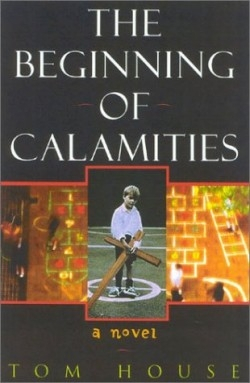The Beginning of Calamities
It is 1973: “The Partridge Family”rules the hearts of prepubescent girls on television, and music is played on vinyl records. Danny Burke, a loner in his 5th grade class at Our Lady of Perpetual Help, longs to be accepted by the popular bullies, but knows better than to push his luck. An underweight redhead with a very bad stutter, Danny realizes he’s doomed when, in March, the Long Island snows melt, and it’s time to face the meaner side of recess. Helpless at sports, awkward amongst his peers, Danny devises a way to stay inside the classroom—he writes an Easter play and convinces his teacher to produce it.
What begins as a ploy turns into a transformation as Danny’s homosexuality awakens alongside his faith. He invents a friend, a naked boy named Arram. Together they explore the sensuality of Jesus’s suffering. Danny aspires to play the part of Jesus in the play; however, his teacher, Liz, while impressed with the boy’s writing, knows he could never carry it off—the pressure would be too great. Ironically, no other child in the class wants the part. In fact, only the lowest caste of students, those she thinks of as “the leper colony”—children with lisps, weight problems, eyeglasses, intelligence, and/or a non-white racial background—are interested in participating at all.
Liz is a first-year teacher, and not quite grown up. She sneaks out of class for cigarettes and tries desperately to please the senior teachers. While she instinctively rebels against being associated with the “leper” students, she is unable to convince the cool kids to take part in the play. “She notes with bitter envy their graceful, confident movements, and notes what fine actors they’d make, possessing, as they do, the world’s good regard.”
Who does not want the world’s good regard? It’s easy to empathize with both Liz and Danny. In fact, the reader might empathize too readily, squirming at painfully resurrected memories of classroom bullies, the desire to be liked, the terror of speaking before a large group of peers for the first time. The preface of the book lets on that the play has dismal consequences for both Danny and Liz. Perhaps if this knowledge had not been leaked, the reader might squirm less. But the author, who has published in Harper’s, New England Review, and The Best American Gay Fiction, has command of lyrical, truthful prose. His language carries the story along, and the outcome is not as hopeless at it first may seem.
Disclosure: This article is not an endorsement, but a review. The publisher of this book provided free copies of the book to have their book reviewed by a professional reviewer. No fee was paid by the publisher for this review. Foreword Reviews only recommends books that we love. Foreword Magazine, Inc. is disclosing this in accordance with the Federal Trade Commission’s 16 CFR, Part 255.

